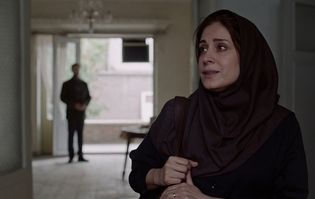News
BALLAD OF A WHITE COW
Media:

Already devastated by her husband's execution, Mina (played by co-director Maryam Moghaddam) discovers that the man she loves was put to death for a crime he didn't commit in "Ballad of a White Cow." That would seem to be injustice enough for one person to bear, but in conservative Iranian culture, now that Mina's a widow, she has less power than ever: Fired from her job, evicted from her apartment and pressured toward marrying her pushy brother-in-law (Pourya Rahimiam), Mina faces limited options when it comes to caring for her deaf-mute daughter, Bita (Avin Poor Raoufi).
If all of this sounds like a recipe for a thoroughly depressing spiral toward the bottom, à la "Bicycle Thieves" and its neorealist ilk, think again. Sure, "Ballad" can be brutal, but Moghaddam and co-helmer Behtash Sanaeeha (who first collaborated on "Risk of Acid Rain") also see it as a story of resilience in a society that puts enormous limits on women. In some ways, "Ballad" feels engineered to put a maximum number of obstacles in Mina's path, but as executed, the movie doesn't feel the slightest bit didactic, despite its unusually stiff style.
Nearly every shot in this film is locked down and squared off, staring either straight at or directly perpendicular to its characters, like a Wes Anderson movie, minus all the wallpaper and whimsy. You could count on one hand the number of times DP Amin Jafari's camera moves, and yet, this restraint reads as solemn non-interference. The co-directors seem determined to avoid the semblance of sentimentality or emotional manipulation. The duo are clearly fans of populist cinema, judging by the importance movies play to their characters (Bita is named for a popular 1972 local hit, and loves cinema infinitely more than school), but they've taken a more formalist approach to their own work: precise compositions, few if any close-ups, no music.
By Peter Debruge
VARIETY
READ MORE: 'Ballad of a White Cow' Review: An Iranian Widow Seeks Justice - Variety



















